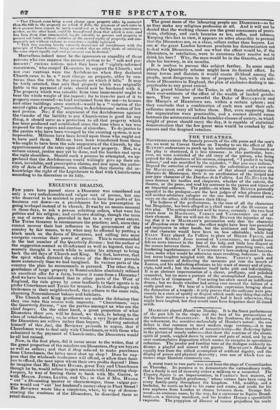EXCLUSIVE DEALING.
Fart years have passed since a Dissenter was considered not only a very unfashionable and vulgar sort of person, but one who deserved to be mulcted in pocket—to have the profits of his business cut down—as a punishment for his presumption in going to chapel instead of to church. It was by no means unusual in those days, to ask a person soliciting orders, what were his politics and his religion; and exclusive dealing, though the term 38 one of newer date, prevailed in fact to a very great extent. The Tories threaten to recommence the practice; and, since they cannot recover their lost influence in the government of the country by fair means, to try what may be effected by putting a black mark on the doors of Dissenters, and calling into most energetic exercise their power of purse. This is recommended in the last number of the Quarterly Review ; but the author of the suggestion seemed so ill-informed as well as bigoted, that we scarcely thought it worth while to notice his attempt to bring back the old days of' Church and King. We find, however, that the spirit which dictated the advice of the Reviewer prevails more extensively than we had imagined. In various parts of the country the plan he recommends is pursued. The other day, a gentleman of large property in Somersetshire absolutely refused an excellent offer for a farm, because it came from a Dissenter ! And we have been informed that in other parts of the West of England, the rule given by some landlords to their agents is to prefer Churchmen and Tories for tenants. In their dealings with tradesmen in their neighbourhood, they adhere to the same rule, shunning Nonconformist bakers and butchers.
The Church and King gentlemen are under the delusion that they can take this course with impunity. " Churchmen," says the Quarterly Review, " are the parties amongst us who are the chief buyers. On the other band, a great proportion of what Dissenters there are, will be found, we think, to belong to the class of retail-dealers; or, in other words, a very large division of the Dissenters are sellers rather than buyers." Having satisfied himself of this fact, the Reviewer proceeds to argue, that if Churchmen were to deal only with Churchmen, or with those who submitted to the payment of Church-rates, the Dissenters would be all but ruined.
Now, in the first place, did it never occur to the writer, that if the great proportion of the retailers are Dissenters, they are buyers as well as sellers ; and that if they refused to make purchases from Churchmen, the latter must shut up shop ? Does he sup- pose that the wholesale tradesmen will offend, or allow their fami- lies to offend, the men upon whom their own profits depend ? Does be imagine that Mr. HENRY Ho SHE, great Tory and Churchman though he be, would refuse to open accounts with Dissenting shop- keepers, by way of forcing them to bank with Mr. GROTE, or with Messrs. JONES, LLOYD, and Co.; or that if Mrs. HOARE " cut" a Dissenting mercer or cheesemonger, those vulgar per- sons would not "cut" her husband's money-shop in Fleet Street ? The Reviewer wrote like a simpleton, when, by way of demon- strating the weakness of the Dissenters, he described them as retail-dealers.
The great mass of the labouring people are Dissenters—so far
as they make any religious profession at all. And it will not be denied that the working classes are the great consumers of provi- sions, clothing, and such luxuries as tea, coffee, and tobacco.
Keeping this fact in view, it appears an utter absurdity to pretend that the Dissenters are, as a class, sellers rather than buyers. Let one ol' the great London brewers proclaim his determination not to deal with Dissenters, and see what the effect would be, if the Dissenters, in retaliation, were to announce their resolve not to drink his beer ! Why, the man would be in the Gazette, or would close his brewery, in six months. It is useless to pursue this subject further. In some small places, the Quarterly scheme might have its desired effect. In many towns. and districts it would create ill-blood among the people, most dangerous to men of property ; but, with six mil-. lions of Dissenters in England, the plan of exclusive dealing is practicable to any great extent.
The grand blunder of the Tories, in all these calculations, is their over-estimate of the effect of the wealth of landed gentle- men. They see how powerful the Duke of BUCCLEUCH and the Marquis of HERTFORD are, within a certain sphere ; and they conclude that a combination of such men and their sub- ordinates must carry all before them. But, even supposing that the organization were practicable, and a contest should ensue between the aristocratic and the humbler classes of society, in which weight of purse should carry the day, it is capable of statistical demonstration that the few great men would be crushed by the masses and the despised retailers.


























 Previous page
Previous page